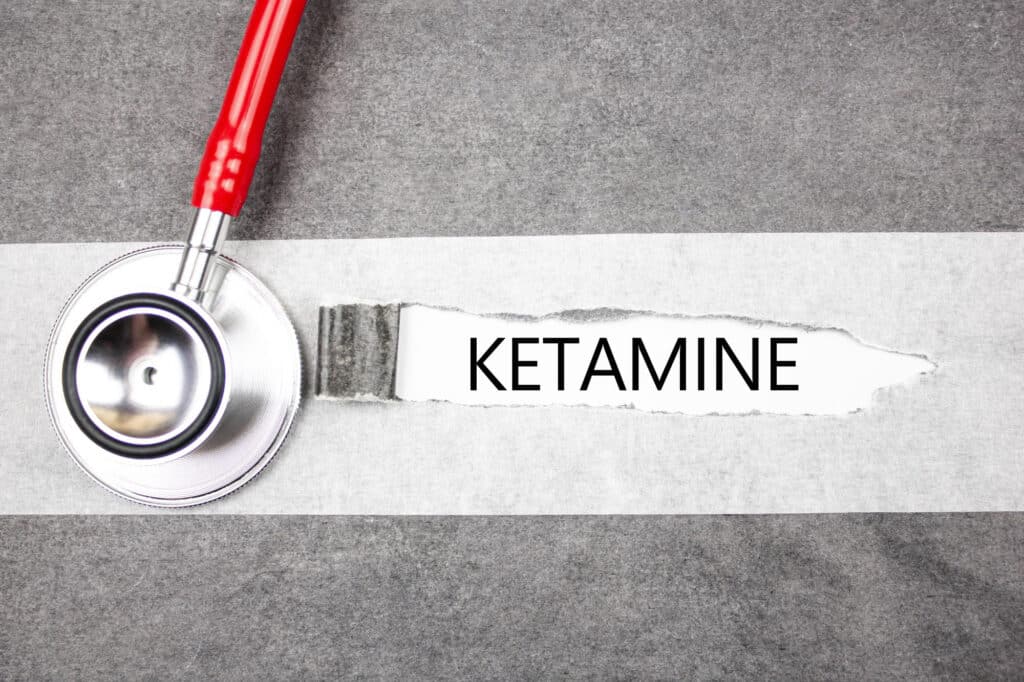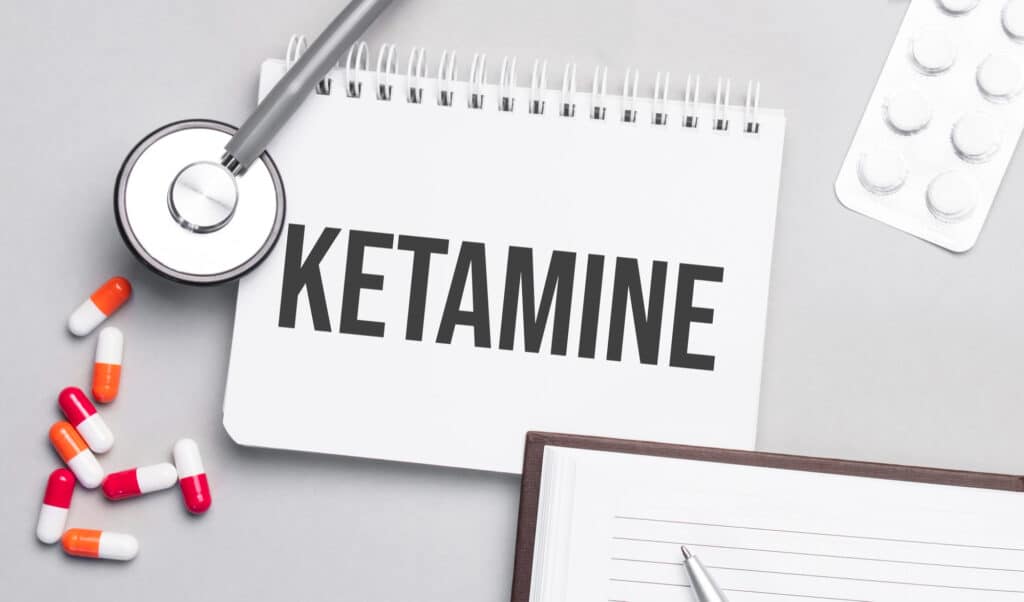Perhaps you’ve heard of ketamine as a recreational drug associated with raves (“Special K”). But have you heard of ketamine-assisted psychotherapy (KAP)—a groundbreaking approach in the field of mental health treatment, particularly for adults?
In this post, I explain what KAP is, how it works, and what to expect, as well as provide more technical resources for the curious.
Ketamine is a Schedule Ill medication approved as an “off-label” treatment for various chronic “treatment-resistant” mental conditions, often having a positive effect when current treatment methods haven’t worked.
At its core, KAP combines the use of ketamine, a medication originally developed as an anesthetic, with psychotherapy sessions. KAP uses low-dose (subanesthetic doses) of ketamine.
This combination aims to facilitate deeper psychological insights and emotional processing, which can be particularly beneficial for those struggling with various mental health conditions, including substance abuse.

Why Ketamine-Assisted Therapy Is Innovative
Ketamine is a dissociative anesthetic drug. which means a sense of disconnection from the usual self and ordinary reality.
Most people receiving the light-approved doses will most likely experience mild anesthetic, antidepressant, anxiety-reducing, and, potentially, psychedelic effects.
Recently, ketamine has attracted attention as a rapid-acting antidepressant but other studies have also reported its efficacy in reducing problematic alcohol and drug use.
Ketamine is innovative in that it works differently from traditional antidepressants. It acts on the NMDA receptors in the brain, which are the receptors of glutamate, the primary excitatory neurotransmitter in the human brain.
For those with depression, it leads to rapid antidepressant effects, often noticeable within hours of administration.
This rapid action contrasts starkly with conventional antidepressants which may take weeks to exhibit any noticeable effect.
Promising Results of KAP
Ketamine-assisted psychotherapy has shown promising results in adults suffering from a range of mental health issues, including treatment-resistant depression, anxiety disorders, post-traumatic stress disorder (PTSD), and certain chronic pain conditions.
KAP is particularly significant for individuals who have not responded well to traditional forms of therapy or medication, offering a new avenue for relief and healing.
The unique properties of ketamine allow for a temporary altered state of consciousness, which can provide therapeutic benefits when paired with guided psychotherapy.
KAP’s Importance in Addiction Treatment
In the realm of addiction treatment, KAP holds a unique place. Addiction often coexists with other mental health disorders, and the conventional approach to addiction therapy might not be effective for everyone.
One scientist (I. Ezquerra-Romano 2018) has commented that despite the relative infancy of the field, results thus far are promising that ketamine can effectively prolong abstinence from alcohol and heroin in detoxified alcoholics and heroin-dependent individuals, respectively.
Moreover, ketamine has been shown to reduce craving for and self-administration of cocaine in non-treatment-seeking cocaine users.
However, further randomized controlled trials are needed to confirm ketamine’s efficacy.
Possible mechanisms by which ketamine may work within addiction include:
- Enhancement of neuroplasticity and neurogenesis
- Disruption of relevant functional neural networks
- Treating depressive symptoms
- Blocking reconsolidation of drug-related memories
- Provoking mystical experiences
- Enhancing Psychological Therapy Efficacy
Ketamine’s ability to facilitate deeper introspection and emotional breakthroughs can be particularly beneficial in addressing the underlying psychological aspects of addiction.
This makes KAP a valuable tool in the comprehensive treatment of addictions, potentially leading to more sustainable recovery outcomes.
KAP is an innovative and promising approach to the treatment of various mental health issues, particularly for adults who have found little relief in traditional therapies.
Its rapid action, combined with the depth of psychological exploration it facilitates, places KAP at the forefront of modern mental health treatments.
As research continues and its applications expand, KAP could redefine therapeutic approaches in mental health and addiction treatment.

Why We Use Ketamine-Assisted Psychotherapy
KAP has emerged as a significant intervention in mental health care, offering new hope and avenues for treatment where traditional methods have fallen short.
KAP is one of the innovative treatment approaches we use at Corner Canyon Health Centers.
We offer ketamine therapy in Utah, but we service clients all across the US.
Understanding why KAP is used, its target clientele and the main reasons for its application provides insight into its growing prominence in mental health treatment.
The Appropriate Clientele for KAP
KAP is primarily targeted towards adults grappling with severe mental health challenges, particularly those who have not found relief through conventional therapies. This includes individuals with:
Treatment-Resistant Depression: A significant portion of patients with depression do not respond to standard antidepressant medications.
KAP offers a novel approach for these individuals, often yielding rapid improvements where other treatments have failed.
Chronic Anxiety Disorders: For those with debilitating anxiety, especially forms resistant to traditional therapy and medication, KAP can provide a breakthrough in managing symptoms.
Post-Traumatic Stress Disorder (PTSD): KAP has shown promise in helping individuals process traumatic memories and reduce Post-Traumatic Stress Disorder (PTSD) symptoms in a controlled, therapeutic setting.
Substance Use Disorders: KAP can play a crucial role in addiction treatment, particularly by addressing the underlying psychological issues and trauma often associated with addiction.
Main Reasons for Using KAP
Rapid Symptom Relief: One of the most compelling reasons for using KAP is its ability to provide rapid relief from symptoms.
Unlike conventional antidepressants that can take weeks to show effects, ketamine can produce noticeable improvements in mood and outlook within hours to days.
High Efficacy in Treatment-Resistant Cases: KAP has proven effective in cases where traditional treatments have failed, offering a lifeline to those who have struggled with persistent mental health issues.
Enhanced Emotional Processing: Ketamine’s unique psychological effects can facilitate deeper emotional and introspective experiences during therapy sessions.
This can lead to breakthroughs in understanding and processing emotional trauma, core beliefs, and negative thought patterns.
Comprehensive Approach: KAP combines pharmacological intervention with psychotherapy, offering a more holistic approach to mental health treatment.
This combination ensures that while ketamine opens up new pathways in the brain, psychotherapy guides the patient in making meaningful psychological changes.
Potential for Long-Term Improvement: Initial studies and clinical experiences suggest that KAP can lead to long-lasting improvements in mental health.
This is especially so when incorporated into a broader treatment plan that includes ongoing therapy and support.
In summary, KAP provides hope for individuals struggling with severe and treatment-resistant mental health conditions.
Its rapid and effective relief, ability to facilitate deep emotional processing, and the comprehensive nature of the treatment make it a valuable tool in contemporary mental health care.
As research continues to evolve, KAP’s role in treating complex mental health issues is likely to expand, offering new possibilities for healing and recovery.

What’s The Science Behind KAP?
How KAP Began
Ketamine, first synthesized in 1962 by Calvin Stevens at Parke-Davis, was primarily used as an anesthetic in medical settings. Its potential in psychotherapy, however, was not immediately realized.
It was only in the late 1990s and early 2000s that researchers began exploring ketamine’s rapid-acting antidepressant properties. Dr. John Krystal at Yale University was among the pioneers in researching ketamine’s effects on depression.
The use of ketamine in psychotherapy specifically, pairing the drug’s psychotropic effects with the psychotherapeutic process, began gaining traction in the 2000s.
This approach was partly inspired by the historic use of psychedelics in psychotherapy during the mid-20th century.
Clinicians and researchers started to notice that ketamine could catalyze profound psychological insights and emotional healing, especially when combined with psychotherapy.
The Science Behind KAP
The science behind KAP is rooted in how ketamine affects the brain. Ketamine is an NMDA receptor antagonist, which means it blocks these receptors in the brain, leading to an increase in the release of neurotransmitters like glutamate.
This action stimulates the growth of new synapses, potentially “resetting” certain neural pathways, which can be particularly beneficial in conditions like depression and PTSD.
This neuroplastic effect is what makes ketamine a promising tool in psychotherapy, as it creates a window of increased brain plasticity where therapeutic interventions can be more effective.
Recent Scientific Validation for KAP
Recent studies have provided scientific validation for the use of KAP in treating various mental health conditions. Key studies include:
Efficacy in Treatment-Resistant Depression: A study by Murrough et al. (2013) demonstrated that ketamine significantly reduced depression symptoms in treatment-resistant patients, compared to a placebo.
Use in Chronic PTSD: Feder et al. (2021) conducted a randomized controlled trial that found ketamine infusions, combined with psychotherapy, produced significant reductions in PTSD symptom severity..
Long-Term Outcomes: A review by Dore et al. (2019) analyzed various studies and found that ketamine, when used alongside psychotherapy, has the potential for lasting therapeutic effects in mood disorders.
Ethical Principles: A 2021 study by Singh et al found that “based on current evidence, ketamine use for severe, treatment-resistant depression does not violate ethical principles; however, clinicians and professional bodies must take steps to ensure that guidelines for good practice are enacted, that all experimental and trial data are made available through national registries, and that the risk potential of ketamine treatment continues to be monitored and modeled.”
These studies, among others, provide a scientific basis for the effectiveness and safety of KAP in treating mental health disorders, especially those resistant to traditional treatments.
The combination of ketamine’s rapid antidepressant effects and its ability to enhance the therapeutic process makes KAP a promising approach to mental health treatment.
In summary, the development and validation of KAP mark a significant advancement in mental health care.
The scientific community continues to explore and understand its full potential, paving the way for more effective and comprehensive treatments for various mental health conditions.

How is KAP Typically Administered?
Who Can Benefit from KAP?
Individuals with treatment-resistant depression, PTSD, severe anxiety, and substance use disorders, particularly those who have not responded to traditional therapies, can benefit from KAP.
It’s important to screen patients carefully to ensure they are suitable candidates for this treatment.
How is KAP Administered?
In brief, at Corner Canyon Health Centers, we offer a 6-week course of Ketamine shots, administered intramuscularly in a quiet private room and supervised by medical personnel. This is followed by a therapy session with the primary therapist.
Subsequent group and individual therapy sessions throughout the week also capitalize on the increased neuroplasticity of the brain to achieve greater therapeutic gains than possible otherwise.
The typical process is as follows:
1. Initial Assessment and Screening
Patient Selection: Screen potential patients for suitability, focusing on adults with treatment-resistant depression, PTSD, severe anxiety, or substance use disorders.
Exclude those with a history of psychotic disorders or severe heart conditions.
Medical and Psychological Evaluation: Conduct thorough medical and psychological evaluations to assess the patient’s physical and mental health status, including a detailed psychiatric history.
2. Pre-Treatment Preparation
Informed Consent: Ensure patients understand the process, potential risks, and benefits of KAP. Obtain informed consent.
Psychoeducation: Provide education about ketamine, its effects, and what to expect during and after treatment.
Baseline Data Collection: Collect baseline data on symptoms and functioning to track progress.
3. Ketamine Administration
Setting: Administer ketamine in a calm, comfortable, and controlled environment, ideally with soothing elements like soft lighting and gentle music.
Dosage and Administration: Administer ketamine intravenously or intramuscularly under medical supervision, with dosages tailored to the individual’s needs.
Monitoring: Continuously monitor vital signs and patient well-being during the administration.
4. Integration Psychotherapy Sessions
Timing: Schedule psychotherapy sessions shortly after ketamine administration when patients are most receptive.
Therapeutic Approach: Use integrative psychotherapeutic techniques to help patients process experiences, emotions, and insights elicited by ketamine.
5. Post-Treatment Follow-up
Monitoring and Support: Provide post-treatment support and monitor for any adverse effects.
Ongoing Assessment: Regularly assess the patient’s mental health status to evaluate the treatment’s effectiveness and adjust the plan as necessary.
6. Safety and Ethics
Safety Protocols: Adhere to strict safety protocols and emergency procedures.
Ethical Practice: Maintain ethical standards, respecting patient autonomy and confidentiality
Common Misconceptions about KAP
- “Ketamine is just a recreational drug”: While ketamine can be misused recreationally, in a controlled, clinical setting, it is administered at therapeutic doses under medical supervision.
- “KAP is a quick fix”: While ketamine can provide rapid symptom relief, it is not a standalone cure. The psychotherapy component is crucial for long-term healing.
- “KAP is suitable for everyone”: KAP is not appropriate for everyone. It’s not recommended for individuals with certain medical conditions or a history of psychotic disorders.
- “KAP is risky and unsafe”: When administered in a controlled, clinical environment by trained professionals, KAP is generally safe. However, like any treatment, it carries some risks, which should be discussed with patients.
KAP is an advanced therapeutic approach that should be administered with care, professionalism, and empathy, keeping in mind the individual needs and safety of each patient.
The combination of ketamine’s pharmacological impact with psychotherapy offers a unique and effective treatment for certain mental health conditions.

What to Expect After Your KAP Sessions
Ketamine-assisted psychotherapy (KAP) is a novel treatment that combines the use of ketamine with psychotherapy to address various mental health conditions.
Understanding what to expect after KAP sessions is important for individuals considering this therapy.
The experience can vary from person to person, but there are common elements in terms of immediate feelings and potential aftereffects.
Clients will typically feel relaxed and calm after treatment and may experience positive changes in personality, mood, and cognition during treatment, in the time afterward, and in the week that follows.
The ketamine experience is designed to enable an individual’s healing wisdom to be accessed.
The psychotherapy support received will help in making the experience make sense and be valuable to you.
The therapy will help change patterns of thinking and behavior that are of concern and can be causing difficulty.
How Will I Feel Immediately After a Session?
Altered Sensory Perception: Right after a KAP session, you may still experience altered states of consciousness or changes in sensory perception.
These effects typically diminish within a few hours.
Emotional Shifts: Many patients report feeling a sense of calm, relief, or emotional upliftment following a session.
This can be accompanied by a newfound perspective or insight into personal issues.
There are also ongoing personal reports that it can aid in existential, psychological spiritual crises, as well as growth in these areas.
Physical Relaxation: A sense of physical relaxation or even tiredness is common post-session.
Some individuals might feel a bit disoriented immediately after, but this usually resolves quickly.
Cognitive Changes: You may notice changes in thought patterns or a decrease in negative thinking.
There can be a sense of mental clarity or a shift in perspective regarding personal challenges.
Are There Any After Effects?
Short-term Effects
Nausea or Dizziness: Some people experience mild nausea or dizziness after ketamine administration, which usually resolves within a few hours.
Fatigue: It’s common to feel tired after a session. Plan to rest and avoid operating heavy machinery or driving immediately following treatment.
Headache: A mild headache is possible but typically not severe.
Long-term Effects
Improved Mood: Many patients report sustained improvements in mood and outlook. The effects can be felt for days or weeks after treatment.
Reduced Symptoms: Symptoms of depression, anxiety, or PTSD may significantly decrease, contributing to an overall improvement in quality of life.
Enhanced Self-Awareness: The introspective nature of KAP can lead to increased self-awareness and personal growth.
Integration Process
Processing Emotional Insights: Post-session, you might find yourself processing the emotional insights and revelations experienced during therapy. This can be a powerful part of healing.
Continued Psychotherapy: Ongoing psychotherapy sessions are essential for integrating these experiences into meaningful and lasting changes in your life.
Follow-Up and Support
It’s vital to maintain open communication with your healthcare provider about your experiences and any concerns post-treatment.
Regular follow-up appointments are important to monitor progress and make any necessary adjustments to your treatment plan.
In summary, after KAP sessions, patients can expect to experience a range of emotional, cognitive, and physical effects.
While immediate post-session effects are generally short-lived, the potential for long-term improvement in mental health and well-being is a significant aspect of KAP.
The integration process through continued psychotherapy is crucial for leveraging the insights gained during KAP for lasting positive change.

Success Stories Following KAP Treatment
Our clients at Corner Canyon Health Centers have described responses to ketamine as “I felt like I had much more access to my emotions, and with a greater ability to remember and process my experiences, in combination with my emotions, and ended up feeling lighter and happier”.
Our experience has been that clients typically make faster progress in therapy, and do deeper work than they are capable of before beginning Ketamine.
We find that it accelerates the therapy process in addition to giving clients relief and hope.
Success Story 1: Overcoming Treatment-Resistant Depression
Background: Sarah, a 35-year-old graphic designer, had struggled with major depressive disorder since her early twenties.
Despite trying multiple antidepressants and years of traditional psychotherapy, her symptoms persisted, severely impacting her work and personal life.
KAP Journey: Sarah began a KAP program after her psychiatrist suggested it as an option. Initially skeptical, she underwent six KAP sessions over three months.
During these sessions, Sarah experienced profound emotional breakthroughs, gaining new insights into her life’s challenges.
Outcome: The change in Sarah was remarkable. She reported a significant reduction in depressive symptoms, with an increased sense of hope and motivation.
Her creativity, which had been stifled by her depression, returned, leading to a flourishing career and improved relationships.
Months after completing the KAP program, Sarah continued to feel the benefits, describing the experience as life-changing.
Success Story 2: Healing from PTSD and Anxiety
Background: David, a 40-year-old veteran, suffered from severe PTSD and anxiety stemming from his military service.
Traditional therapies had provided limited relief, and his condition was complicated by chronic pain.
KAP Journey: David’s therapist recommended KAP as a part of his treatment plan. Over a series of sessions, David experienced a softening of his traumatic memories.
The ketamine facilitated a space where he could revisit these memories with less fear and pain.
Outcome: Post-treatment, David’s anxiety levels had significantly decreased, and his sleep improved.
He felt more present in his daily life and found it easier to engage in social activities and family life.
David credited KAP with giving him the tools to manage his PTSD symptoms effectively and regain control over his life.
Success Story 3: Breaking the Chains of Addiction
Background: Maria, a 28-year-old teacher, battled alcohol addiction for several years.
Her addiction was rooted in deep-seated emotional issues and a history of trauma, which traditional addiction treatments had not adequately addressed.
KAP Journey: Maria started KAP as part of a comprehensive addiction treatment program.
The ketamine sessions provided her with a new perspective on her life and addiction, revealing underlying emotional pain that needed healing.
Outcome: Maria reported a drastic reduction in her cravings and a renewed sense of purpose. She engaged more fully in her psychotherapy sessions, using insights gained during KAP to work through her trauma.
Six months into her recovery, Maria was sober and felt empowered to continue her journey with a stronger sense of self and emotional resilience.
These success stories illustrate the transformative potential of KAP in treating various mental health conditions.
Each individual’s experience highlights the unique way KAP can catalyze personal growth and healing, offering new hope where traditional treatments may have fallen short.

Key Takeaways
- Ketamine is not just a recreational drug. We offer ketamine therapy in Utah, but we service clients all across the US.
- Ketamine-assisted psychotherapy, while innovative, has scientifically validated studies showing it is safe and effective for appropriate individuals and indications when administered correctly by medical professionals and licensed therapists as we do at Corner Canyon Health Centers.
- KAP is primarily targeted towards adults grappling with severe mental health challenges, particularly those who have not found relief through conventional therapies.
- The main benefits of KAP include rapid symptom relief, high efficacy in treatment-resistant cases, enhanced emotional processing, and a comprehensive approach.
- This combination ensures that while ketamine opens up new pathways in the brain, psychotherapy guides the patient in making meaningful psychological changes.

Sources
The following scientific research publications, among many, validate that ketamine-assisted psychotherapy, when administered correctly by trained medical professionals and psychotherapists, is effective and safe.
Dore, J. et al. 2019. Ketamine Assisted Psychotherapy (KAP): Patient Demographics, Clinical Data and Outcomes in Three Large Practices Administering Ketamine with Psychotherapy. J Psychoactive Drugs. 2019 Apr-Jun;51(2):189-198. In https://pubmed.ncbi.nlm.nih.gov/30917760/
Ezquerra-Romano, I. et al. 2018. Ketamine for the treatment of addiction: Evidence and potential mechanisms. Journal of Neuropharmacology. 2018.01.07
Feder, A., et al. (2021). Efficacy of Intravenous Ketamine Combined With Psychotherapy in Patients With PTSD. JAMA Psychiatry, 78(12), 1341-1351. In https://pubmed.ncbi.nlm.nih.gov/33397139/
2020 safety review of 6630 patients.
Feifel, David, David Dadiomov, and Kelly C Lee. “Safety of repeated administration of parenteral ketamine for depression.” Pharmaceuticals 13.7 (2020): 151.
Ionescu, D.F. et. 2018. Ketamine-Associated Brain Changes: A Review of the Neuroimaging Literature. Harv Rev Psychiatry. 2018 Nov-Dec; 26(6): 320–339. In https://www.ncbi.nlm.nih.gov/pmc/articles/PMC6102096/
2021 review of neurobiological mechanisms.
Kohtala, Samuel. “Ketamine—50 years in use: from anesthesia to rapid antidepressant effects and neurobiological mechanisms.” Pharmacological Reports (2021): 1-23.
Murrough, J. W., et al. (2013). Rapid and Longer-Term Antidepressant Effects of Repeated Ketamine Infusions in Treatment-Resistant Major Depression. Biological Psychiatry, 74(4), 250-256. In https://pubmed.ncbi.nlm.nih.gov/22840761/
2017 review on ethics and safety.
Singh, I., Morgan, C., Curran, V., Nutt, D., Schlag, A., & McShane, R. (2017). Ketamine treatment for depression: opportunities for clinical innovation and ethical foresight. The Lancet Psychiatry, 4(5), 419-426.
2022 systematic review of 83 trials.
Walsh, Zach, et al. 2022. “Ketamine for the treatment of mental health and substance use disorders: comprehensive systematic review.” BJPsych Open 8.1.
